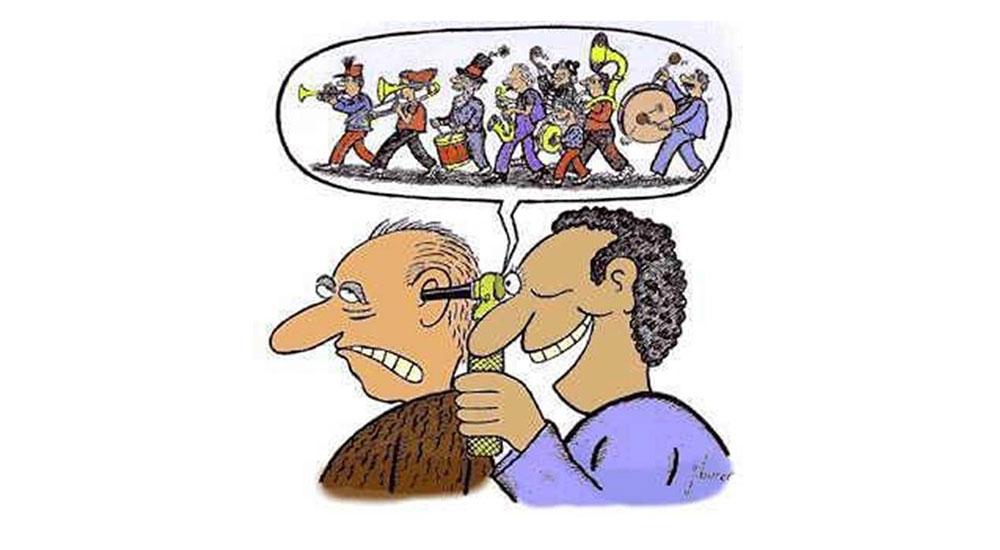
Is There Help for Noise Induced Tinnitus
“Protect your hearing!”
“It’s louder than you think!”
“Wear musician’s plugs”
You’ve heard it said before. Very likely, we are the ones who said it. Protect your hearing when around loud noises…use musician’s filtered earplugs…try In-Ear monitors onstage.
Saving your hearing – that’s one reason to use hearing protection when surrounded by loud sounds. If you lose your hearing, it’s gone for good. But hearing loss may not be the only effect of loud sound exposure. Oftentimes exposure to loud sounds cause tinnitus or ringing in the ears. Ever go to a loud concert or play with a band and your ears ring afterwards? This is a sign of damage to the auditory system. Sometimes, the ringing resolves. Sometimes – and with increased noise exposure – the ringing remains. It’s not uncommon to hear that the tinnitus (ringing) is what drives a person to seek auditory assistance – not the threat or sensation of hearing loss itself.
Tinnitus is an unwelcome parting gift in a relationship of loud noise/music exposure. Intermittent at first, it can gradually become more constant as the auditory system responds to damage. At best, it’s a nuisance that can be an obstruction to hearing, focus and cognition. At worst, it can be debilitating and handicapping, causing difficulties with thinking and focusing. It can result in increased anxiety, depression and possible paranoia on occasion. The presence of tinnitus can be so debilitating that it can impair a person’s ability to function completely. Productivity can decrease, the ability to work can be impaired, relationships can be impacted and overall quality of life may be reduced significantly. Sometimes the nature of the tinnitus causes such a handicapping impact on a person’s life that they can feel trapped, alone and/or clinically depressed. For some, tinnitus can be so debilitating that thoughts of suicide infiltrate the sufferer’s life. Many tinnitus sufferers are told that there is no solution for cure for their tinnitus. It leads to the sensation of helplessness, which only exacerbates the tinnitus.
There is help for tinnitus sufferers. It takes time, motivation, dedication and work – but there is definitely hope.
The evaluation process is lengthy and thorough in an effort to obtain information regarding the person’s hearing function in conjunction with the tinnitus. The construct of the tinnitus is broken apart into many pieces in order to be able to address it completely. Behaviors and overlapping emotions are identified. Diet is discussed. The evaluative procedure addresses every aspect of the sufferer’s tinnitus and experience before the treatment plan is developed. In truth, the presence of tinnitus is driven by many different variables. A successful treatment plan will address most of these variables in an effort to decrease the tinnitus. Tinnitus treatment can include general exercises, various therapeutic techniques including music and sound stimulation, dietary changes, behavioral changes, physical and respiratory exercises, and/or equipment that helps to retrain the brain processing of the tinnitus sound. The equipment can be a masking device, a sound generator, or various accessories designed for this purpose. Tinnitus differs so greatly amongst individuals and affects everybody differently. Because of this fact, treatment can be highly differentiated. What works for one person may not actually work for someone else. Sometimes, in addition to tinnitus treatment, it is necessary that the sufferer is also treated psychiatrically. The overall impact of tinnitus can truly be so psychologically measurable that it can impair progress without adequate intervention to that end. Psychological counseling and psychotropic medications, when necessary, can be helpful to the overall process. Successful tinnitus treatment is truly a team effort. Several practitioners, mental health counseling, family, friends, general support and the dedication/motivation of the sufferer are all components of this process. It’s a journey – and it takes a lot of work – but there are positive outcomes and there is hope. No tinnitus suffer should feel that there is no hope. No tinnitus suffer should feel despondent or helpless. There is always help.
For anyone suffering with any sounds in their ears, going through treatment is prudent and needed. Consulting with a specialist and determining the best individualized treatment plan is important to the process. Tinnitus can be debilitating, but it’s important to remember that there is hope.
The importance of using hearing protection when exposed to loud noises or music cannot be emphasized enough. Protect against hearing loss. Protect against the onset of tinnitus. Control these symptoms before it’s too late.
If it’s already is too late? Get help. It’s there. It’s available. There is help. The suffering need not be permanent. There is always hope.



